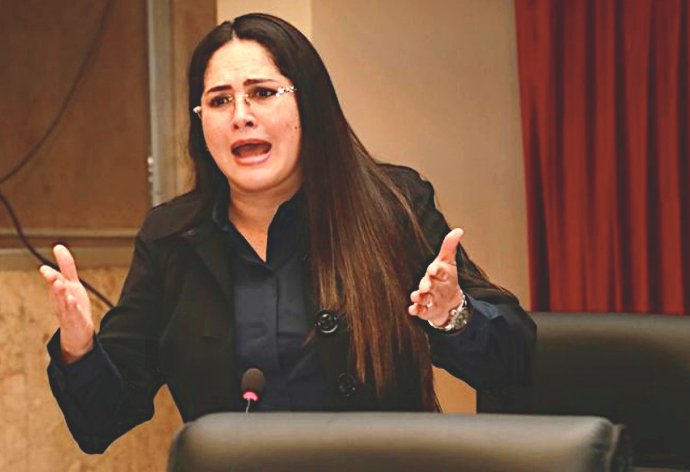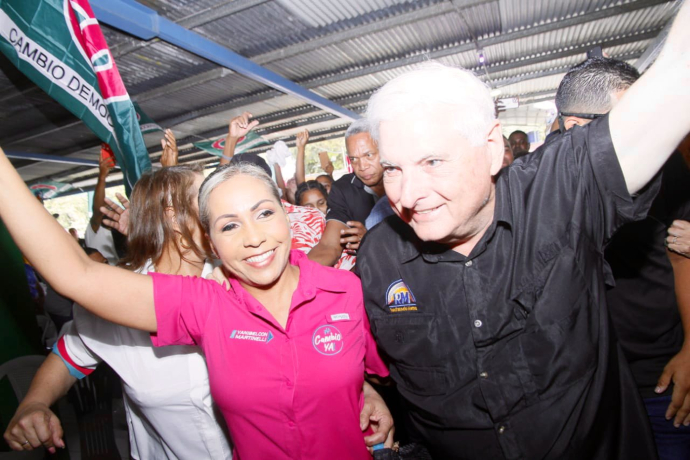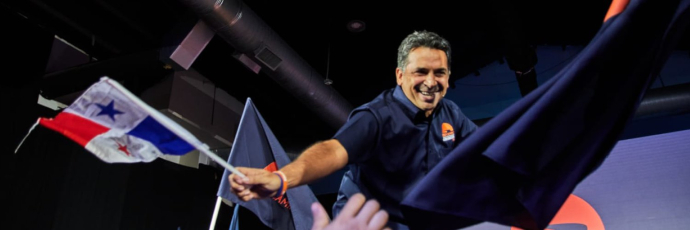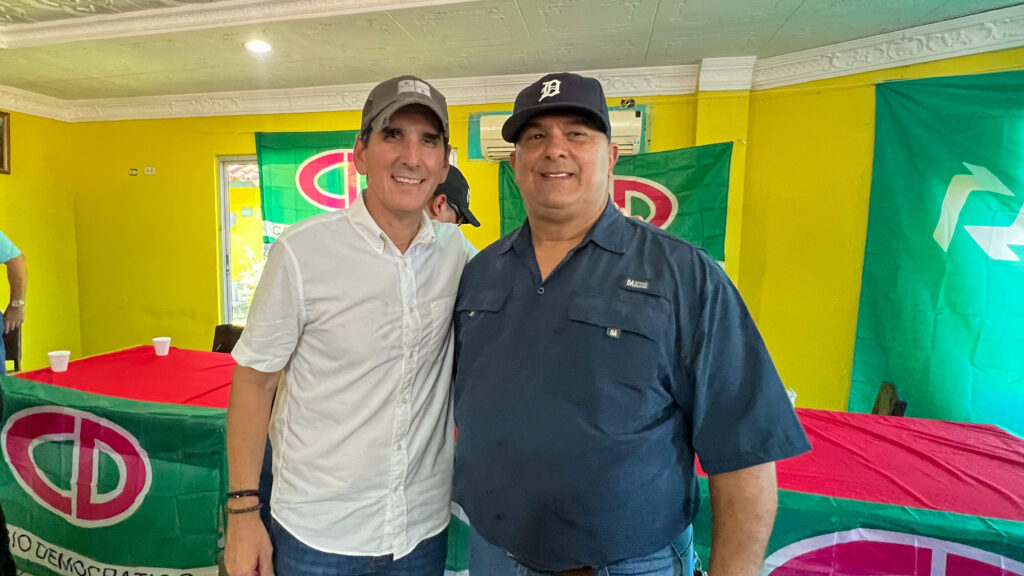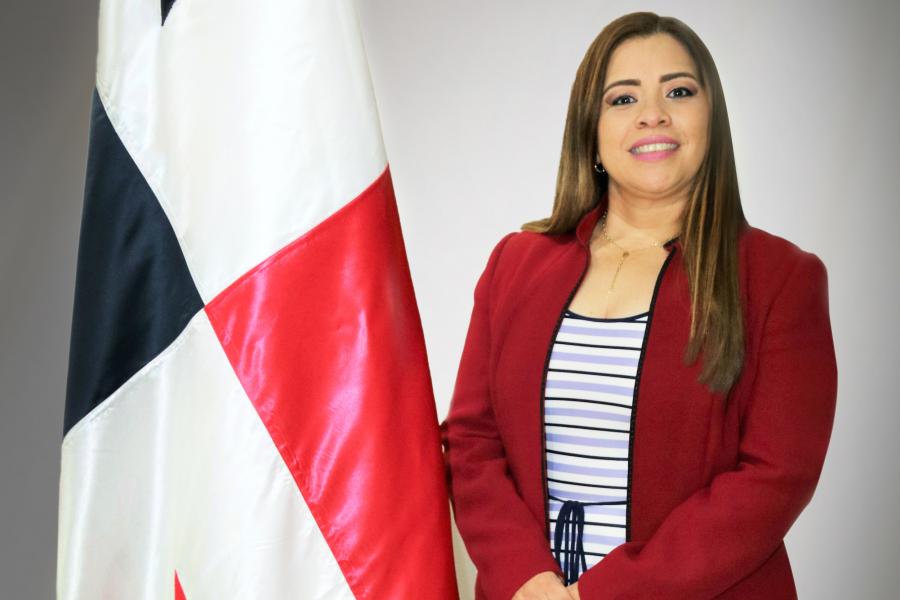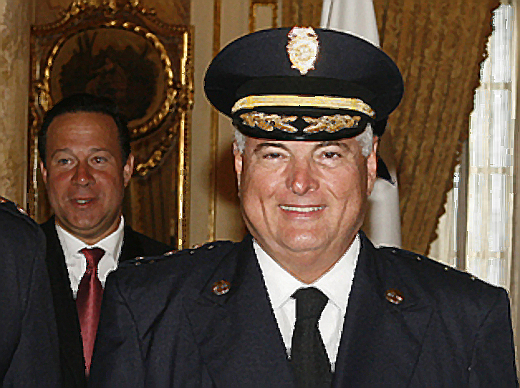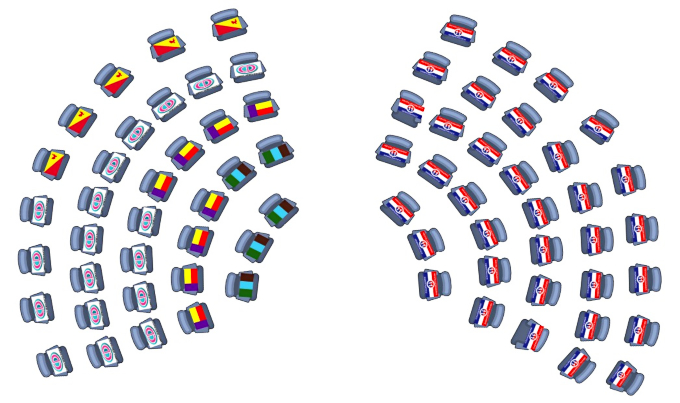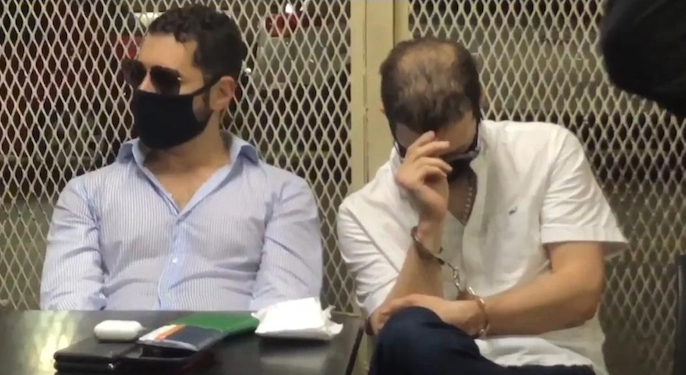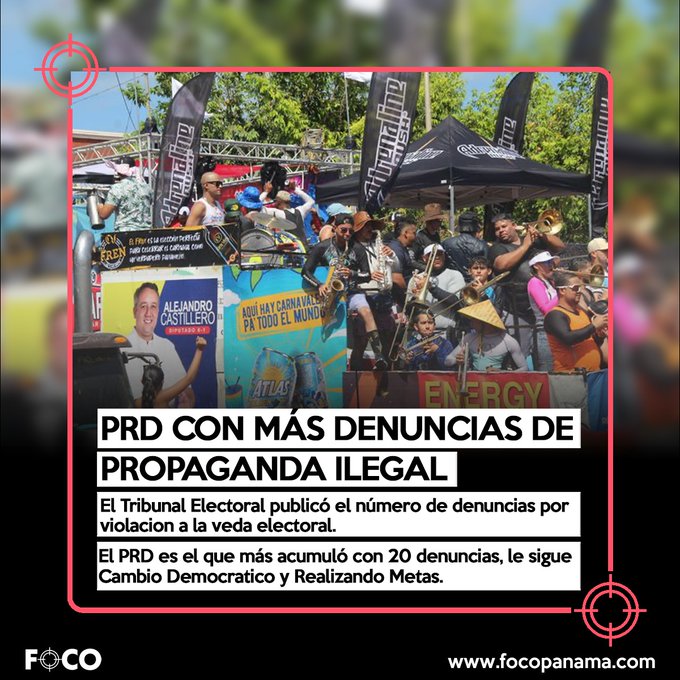He’s got all the gestures and endorsements sort of right. However, history, his performances when Nito has been out of the country and the lack of any larger record that establishes him as other than just another politician all suggest that the next elected president of Panama will not be Gaby Carrizo. A quirk of Panamanian law suggests that if Nito dies or has to step down and Gaby puts on the presidential sash, the latter won’t be eligible to run in 2024. But what would become of someone who declines to do his duty because he wants to be president? Photo from José Gabriel Carrizo’s Twitter feed.
Next year’s presidential race shaping up
by Eric Jackson
Carnival has been time out for political campaigning, even if here or there online the ban appears to have been evaded.
A new party telling people, in the name of the party, to act reasonably and safely during the days of drunken revelry? Leave it for someone to complain and electoral magistrates to judge.
Pseudonymous acolytes, on the face of it coming from outside Panama, running attack posts on social media? Would the election authorities have the capability, resources and inclination to prove who and what they are, and at whose behest they work?
In any case, a long and early campaign season is now underway.
Currently leading the race to gather the most ballot signatures as an independent, sitting PRD deputy Zulay Rodríguez, known for vitriolic National Assembly rants against foreigners, gay men and lesbians, journalists who write unflattering things about her, bankers and it’s anyone’s guess who’s next. She wants to strip away the Panamanian citizenship of those who were born in Panama to foreign citizen parents and to restrict the playing of foreign music on Panamanian radio.
The Independents
There will be three independent presidential candidates on the ballot. Despite long odds and rules intentionally stacked against them, one may yet overcome all that and be the next president. The disgust with all of the political parties and with the political patronage system embedded in our 1972 constitution is palpable and may be strong enough to win a crowded race in which there is no second round runoff. It has never yet happened, but you never know.
So far six people have surpassed the minimum number of signatures to get on the ballot, but only the top three get presented to the voters. Petitioning continues through July 31 of this year. The latest to minimally qualify, but now in fifth place, is leftist economics professor Maribel Gordón, with 48,606 signatures as of late last week. She’s part of the brain trust of the CONUSI labor federation, the most prominent union in which is the militant SUNTRACS construction workers’ organization. The Panamanian left, since the 1960s fragmented into warring communist factions and shades of socialists who won’t align with any authoritarian Marxist-Leninist party, has traditionally included about 10 to 15 percent of the nation’s electorate.
Gordón leapfrogged ahead of former Panameñista deputy Katleen Levy, now with a bit more than 41,000 signed-up supporters.
Although somebody might jump from way behind and overtake one or both of the front runners for most signatures, as it stands now Levy and Gordón are in a battle with fourth-place Eduardo Quirós (56,632 signatures by the pre-Carnival count) and third-place Francisco Carreira (59,311) for that last spot on the ballot. The front-running independents are number one, PRD legislator and xenophobic demagogue Zulay Rodríguez (93,084) and number two, Panameñista Party member and former Minister of Commerce an industry Melitón Arrocha, at 80,153 supporters.
Historically the Electoral Tribunal has found ways to tip the scales to keep independents who stand for something and could thus become disruptors of the usual politics off of the ballot. The magistrates are, after all, notwithstanding their denials of any sort of partisan bent, chosen from the different political parties that have interests in keeping the old paradigms.
Figure that fascism is probably on the ballot in the figure of Zulay Rodríguez, who would likely splinter off part of the PRD vote. Arrocha or Levy would similarly threaten to take Panameñista votes with them.
The way that it works here is that independents are formally prohibited from making ballot alliances with political parties as the small parties traditionally do, but somebody petitioning for ballot status as an independent might renounce that in favor of being a nominee on a party’s or alliance’s ticket, whether or not he or she is in one of the top three spots in the petitioning race. The filing for formation of alliances happens early next year, months after the independents’ petitioning is over.
National Assembly president Crispiano Adames throws his hat into the PRD primary ring.
The PRD
It’s the long-standing habit of Panamanian voters to eject the party the holds the presidency in the next election. The cynical conventional wisdom is that they all steal, so it’s better to make them take turns rather than set their hooks too deeply into Panama.
The long 1968 – 1989 dictatorship from which the PRD arose may be taken by many as proof of the horrors of the extended rule of any one party. However, if a look at that experience is too superficial or if the inquiry extend no further back in time then important aspects of Panamanian militarism and the course of the 21-year dictatorship get missed, even without the conspiracy theories.
General Omar Torrijos founded the Democratic Revolutionary Party in 1979, part of a process of “normalizing” politics that earlier included the drafting of our current constitution by a rump assembly of the nation’s representantes – city council members – who had been elected in 1968. It was a political patronage deal between the military command and those ward heelers who went along with it for a cut of the action.
By the first time that the PRD took the field in a contested presidential election, in 1984, Omar Torrijos was dead, having been killed in a 1981 plane crash about which hypotheses and theories are still spun. The findings of four agencies from three countries were that Torrijos had his pilot do some risky flying in a driving rain at Coclesito, and on this occasion his luck ran out.
Manuel Antonio Noriega, the spymaster whom Torrijos described as “my gangster” maneuvered his way to the top over the ensuing couple of years. When Panama had its first open presidential election after the coup its old nemesis Arnulfo Arias got the most votes, but the Electoral Tribunal, alleging some sort of irregularities in San Miguelito, wiped that huge municipal district off of the total and awarded the race to the PRD’s banker Nicolás Ardito Barletta. Nobody was fooled. Meanwhile the Reagan administration was using cocaine smuggling operations through Panama as a part of supporting the not-very-covert Contra War against the Sandinista government of Nicaragua. (Oh? They say behind Washington’s back, unbeknownst to them? Uh huh.) But Reagan and his crew wanted more and demanded open Panamanian support for the Contra War, a political impossibility within both the PRD and the Panama Defense Forces command structure. There were chains of events orchestrated and otherwise, but by 1987 Noriega was in Uncle Sam’s sights, most of Panama’s political forces had united against the strongman and the PRD, Noriega had removed and replaced Nicky Barletta and the opposition went on to crush the PRD in the 1989 elections – which Noriega and his henchwoman in the Electoral Tribunal, Yolanda Pulice, annulled, just ‘cuz. More events intervened, US military forces invaded, hundreds of Panamanians who has nothing to do with the dictatorship’s abuses were killed and the actual winner of the 1989 election, Guillermo Endara, was belatedly installed as president by US forces in a ceremony at Fort Clayton.
Then in 1994 the old cycle resumed, Endara’s Panameñistas and their allies fragmented, and we got the PRD in the form of Ernesto “Toro” Pérez Balladares back in the presidency, with a bit more than one-third of the vote in a seven-way race.
We might argue about whether, outside of the cycle, the PRD rigged another election, the canal expansion referendum of 2006. The yes side won by an at a glance landslide on the strength of the PRD all turning out to vote for it, the left and the Panameñistas opposing but widespread vote suppression, the quasi-criminalization of the no campaign and a relatively small fraction of the electorate actually turning out to vote. The abuses of that experience, various Martín Torrijos administration scandals plus the weakness of the Panameñistas after the corruption and incompetence of the 1999-2004 Mireya Moscoso administration, gave the Palacio de las Garzas to Ricardo Martinelli for five years.
Anyway, the PRD has had their next turn via the Cortizo administration, most of the party elders have their plan – the transparently corny Vice President José Gabriel Carrizo – but primary challenges are in the making. National Assembly president Crispiano Adames says he’s running for president – which does not also prevent him from running for re-election for his present seat in the legislature. Within the week we will see if anyone else files as a primary challenger to Gaby. Former party leader abd legislator Pedro Miguel González says that he will make an announcement about his plans or lack thereof by the deadline. The gossip is that it may be former Health Minister Rosario Turner but she has yet to make any announcement. The filing deadline is February 26 and the primary will be on June 11.
The backdrops to the intra-PRD drama have an ailing President Cortizo calling for budget restraint and the party’s legislators and local officials thumbing their noses at him, and while party old guard members like Toro Pérez Balladares and 2009 standard bearer Balbina Herrera are backing Carrizo, other party elders like Martín Torrijos, former PRD secretary general and legislator Pedro Miguel González and former Administrative Prosecutor Alma Montenegro are complaining about the process and seem ready to back a primary challenge.
The PRD’s legislative bosses seem content to accept their party’s defeat in the presidential race so long and they and others hold onto their positions in down-ballot races.
But what about National Assembly president Crispiano Adames? He wasn’t the leading vote-getter in his multi-member circuit in the metro area and may figure that a failed primary run for the presidency is a face saving way out of a difficult legislative re-election bid.
From Panama City’s mayor on down, many PRD local officials appear to be playing all of the old games as if there will be no tomorrow – which there may not be, for them.
By size the PRD may look well set. They have the largest membership of all of the parties, nearly three-quarters of a million, and this well-oiled get-out-the-vote organization. But this is a culture in which most people vote in general elections, and there will be a voter roll of more than three million people.
Ricardo Martinelli and Yanibel Ábrego, at a rally of her Cambio Democratico faction, which seeks an alliance with Martinelli. But what if he’s not on the ballot to make up such a slate? Photo from Yanibel Ábrego’s Twitter feed.
Martinelli and other far right factions and leaders
Ricardo Martinelli is raring to come back to the presidential palace, vowing revenge against any and all who oppose him. He wants the party that he created and discarded back and has deployed lawyers, Internet trolls and who knows what other goons to achieve his purposes. The polls have him leading the race, with about 30 percent of the vote. ‘He stole but he got things done’ is his acolytes’ motto.
Yes, he got things done – mostly for himself.
His achievements, as documented in the courts of the United States, Switzerland, Andorra and Spain, include laundering some $28 million in Odebrecht bribes. His sons, after confessing and doing US federal time for their supporting roles in that, are staying quiet about it since they were deported back to here. Later this year their dad goes on trial with a bunch of other people, with some of whom he has long since fallen out, for the Odebrecht scheme.
Also set for trial this year will be a criminal trial for New Business an alleged kickback and money laundering scheme by which he purchased his main propaganda machine, the EPASA newspaper chain that includes El Panama America, La Critica and smaller publications. A conviction in either of those cases almost certainly throws him off of the ballot. The New Business litigation might strip him of his newspaper chain.
There are other investigations underway, contemplated or possibly to be revived by the courts that may yet trap Martinelli. We also don’t know which bombshells the US government, which as barred the entire Martinelli family from entry into the United States, might yet explode over Team Martinelli.
He’s not quite as fickle as his erstwhile friend Donald Trump about throwing old allies and underlings under buses, but Martinelli is that kind of guy. (The falling out with Trump, blame on Trump, who put his name on and his company into the management of a mobbed-up hotel and condo tower which, however, the Colombian developer partner situated in a notorious flood plain. Come ribbon-cutting day and the area was knee-deep in water and Trump’s alternative reality was to blame Martinelli.)
Still, there are figures with totalitarian or kleptocratic politics akin to Martinelli’s and some of them are making nice in probable anticipation of filling the void on the right that would be created if Martinelli is thrown off of the ballot. Zulay Rodríguez is one of those possibilities. So is former National Assembly president Yanibel Ábrego and her faction of the Cambio Democratico party. Religious far right figures like the MOLIRENA legislator from San Miguelito, Corina Cano, could jump on board. If Martinelli is convicted and in some way or another replaced, there will be spots to fill on a reconfiguration or substitute team.
A year and two months is a long time in politics. Panama’s courts and prosecutors have historically been amenable to purchase or persuasion, even if lately they have been striking down spurious acquittals and sending old Martinelli people to prison at an increasing rate. Will trolls from Miami speaking for “real” Panamanians or posting political analysis from Panama City, FLORIDA be able to slow or stop the losing streak? This reporter has been wrong before about the Martinellis’ chances but the prediction from here is that he will be a convicted criminal, ineligible for a spot on the ballot, come next year. And wouldn’t THAT be quite the wild card if it comes to pass?
Fascism is on the march across much of the world, but also has been defeated in many places. For a win in Italy, there are losses in Brazil and the United States. It takes on different symbols and scapegoats from country to country, but also generates opposition everywhere. Expect that as the scene clarifies, there will be a public clamor for an anti-Martinelli coalition if he’s on the ballot, or something similar if somebody on Panama’s far right shows any success at claiming or trying to claim that portion of the political spectrum that has been looking favorably upon the former president. And yes, there would be call center trolls and other hirelings set to the task of aborting any such coalition.
Panameñista Party president, 2019 presidential standard bearer and former Panama City mayor José Isabel Blandón speaks at length about alliances and the current political situation in an interview with Panama En Directo.
The Panameñistas
If you want to get into Panamanian political history that party’s founder, Arnulfo Arias, was actually one of Hitler’s friends from his 1930s days as a diplomat in Mussolini’s Italy. The movement got its start in the 1920s as Accion Comunal, whose members went around in KKK robes and agitated for the expulsion from Panama of West Indian blacks and Asians. After his brother Harmodio got a turn the Palacio de las Garzas, Arnulfo became president and promulgated the 1941 constitution that stripped all those of Asian, Afro-Antillean or Sephardic Jewish ancestry of their Panamanian citizenship, no matter if they, their parents and their grandparents had been born in Panama. The discourse of those times got around to whether it would be a good idea to sterilize the Chinese-Panamanians, which would have been bad news for Zulay Rodríguez Lu’s maternal grandparents.
The racism Uncle Sam may have been willing to tolerate but by 1941 there were German U-boats in the Caribbean Sea, among other things picking off shipments of war materiel and food from the West Coast of the United States heading through the Panama Canal to the British. Franklin D. Roosevelt was not amused and that October, while Arnulfo was in Cuba visiting his eye doctor, a coup was orchestrated via the American Embassy here.
(Yeah, yeah – so very legal. The president had left the country without formal notice to the National Assembly, and the Americans merely reminded the national police chief and the vice president of that, and immediately recognized the new government. So it is said.)
Arnulfo remained popular and had his various comebacks, all of which ended in coups d’etat to send him packing again. The ultimate coup, in October of 1968, sent him and his then teenaged wife, Mireya Moscoso, fleeing to the Canal Zone, then to Francisco Franco’s Madrid.
Within the Panameñista orbit the fascist aura dimmed and then blinked out. After the grand caudillo’s time they even elected a Jew, Katleen Levy, to the National Assembly.
Mireya Moscoso’s 1999-2004 shift in the presidency? She was not her charming, brilliant, witty and urbane husband. The corruption was pretty crude and the arnulfistas spent a decade in the political wilderness after that.
The way back came as junior partners of Ricardo Martinelli – or shall we say partners in crime in the Odebrecht graft schemes? A court will have something to say about that later this year, when Martinelli’s VP and later elected president on his own party’s ticket (2014-2019), Juan Carlos Varela will confront charges as co-defendant with Ricardo Martinelli Berrocal, Martinelli’s two sons and a number of other co-defendants in a bribery and money laundering case.
It’s generally expected that the last Panameñista standard bearer, former Panama City mayor José Isabel Blandón, will run for the presidency again next year. As a junior or senior partner on a coalition slate? The common wisdom – maybe not so wise in times like these – is that for any chance the Panameñistas need to be part of some coalition with an equal or bigger party.
The PRD’s Gaby Carrizo talks about a grand coalition, which is taken by some observers to be with the Torrijistas’ traditional foes, the Arnulfistas. If “Stop Martinelli” becomes the name of the game, that would make a certain amount of sense. But if that comes to pass, it would mean that Ricardo Martinelli retains a grip on the law courts and the Electoral Tribunal, which should not only upset the Panameñistas and the PRD.
One of the many reasons why the Panameñistas may be willing to be a junior partner in an anti-Martinelli coalition, other than how vicious the Martinelistas have been to them? There are two registered Panameñistas seeking to get on the presidential ballot as independents – Melitón Arrocha and Katleen Levy. The odds are good that at least one of them will get on the ballot and split away at least some party members on Election Day 2024.
Ricardo Lombana on the campaign trail. The attorney and former diplomat has run for president before, but this time he doesn’t have the structural impediments of an independent status. Photo from his Twitter feed.
Lombana and Otro Camino
Ricardo Alberto Lombana González was the best-performing independent candidate for president in 2019, garnering just under 19 percent of the vote. Since then he has registered and petitioned to put the Movimiento Otro Comino – Another Road Movement – onto the 2024 ballot as a political party.
A lawyer and the son of an immigrant from Spain, Lombana is the grand-nephew of the late Panamanian feminist icon Clara González. He got a Salesian Catholic education at Colegio La Salle, his law degree at the University of Panama and his LLM in international and corporate law at Georgetown. Then he did more post-graduate studies at Oxford and Harvard. He served as a diplomat in Washington for the Mireya Moscoso and Martín Torrijos administrations, Panameñista and PRD respectively.
Since late in the Martinelli administration he has been a steadfast critic of this country’s public corruption and political patronage system. Don’t count him out as a serious contender for the presidency, but he’s way back in the polls and a lot of events would have to work out right for him to get to the head of the pack. He probably would not be elected without other parties in alliance with his. Still, he surprised a lot of people the last time around and should not be counted out.
Attorney Rómulo Roux, on the left, may end up without a party on the ballot. At least he has the sense to make friends with those who have demonstrated a sense of loyalty, in this case by supporting the Detroit Tigers through their prolonged hard times. Photo from Rómulo Roux’s Twitter feed.
CD – will they even be around? Which faction will control?
Right now Cambio Democratico (CD), which Ricardo Martinelli founded but then lost control of during his flight from prosecution, his fight against US extradition, legal troubles that kept him from running for mayor of Panama City in 2019 and so on. The last time around corporate lawyer Rómulo Roux, a photogenic Catholic conservative and lawyerly prudent man, carried the party banner and became party leader, and turned out to be a dud on the campaign trail.
Martinelli, facing multiple criminal charges in several cases and with an entourage to match, expected to be acclaimed as CD leader again, but Roux and others had different ideas and even the party’s caucus members who are not onboard with Martinelli and his new party are also not onboard with Roux.
Roux and his party group gave instructions to the CD legislative caucus about whom to support for what for various leadership posts in the National Assembly. These were ignored by 15 of the 18 caucus members and Roux et al moved to remove the 15 rebel deputies from the legislature. Meanwhile former National Assembly president, Yanibel Abrego called for an early party leadership convention to remove Roux. The Electoral Tribunal nixed both of these motions but meanwhile the CD party convention delegates’ – and leaders’ – mandates have lapsed. The Electoral Tribunal has cut off the party’s government subsidy, but what’s going on with the ballot status and recognized organization is up in the air and a mess.
Martinelli wants CD as an ally of his new RM party in the elections, and perhaps the PRD or the Panameñistas would like that party on the slate as an ally as well. However the status mess may be resolved, figure that both Roux and Ábrego have their followings which they could take, formally or not, into an alliance with somebody.
If Ricardo Martinelli gets to run for president next year – that is, no disqualifying criminal trial loss this year – might Ábrego be his running mate? OR, if Don Ricky is out of the race, might she be the Realizando Metas stand-in?
CD has more than 307,000 signed-up members – the second-largest party membership at the moment – but it looks like they are a broken remnant on their way to extinction. Nevertheless, in Panamanian politics you never know.
Isn’t that the historical oddity? Corina Cano, the most noteworthy political representative of Panama’s religious hard right, sits in the legislature as a member of a Liberal successor party. National Assembly photo.
The minor parties – MOLIRENA, Partido Popular et al
When Panama separated from Colombia in 1903, there were the Liberal and Conservative parties, the former having by far the most support in the country, the latter in military control of Panama City, Colon and the Panama Railroad route and having just executed the Liberals’ guerrilla general, Victoriano Lorenzo. They quickly declared Liberal political leader Belisario Porras a non-citizen of Panama to keep him off of the ballot.
Within a decade of independence the Conservatives were moribund and by sometime in the 1920s they were extinct. Porras was president and has things named after him all over Panama. There are no monuments to those who ordered Lorenzo’s execution nor those who ruled Porras off of the ballot.
But rather quickly the factionalism among Liberals that had characterized the Colombian period returned, and multiplied prodigiously in the 1920s. The Accion Comunal movement that gave rise to the Panameñistas AND the social reforming militarism of José Remón and later Omar Torrijos that accounts for the roots of the PRD originated among Panamanian Liberals. The one party that retains the word liberal in its name, the Nationalist Republican Liberal Movement (MOLIRENA) sits in the National Assembly as an ally of the PRD, and fights among themselves mostly over the division of political patronage spoils.
In the Colombian period Conservatives were for Catholicism as the official state religion, while Liberals were for a secular government with no state religion. Imagine the incongruity of MOLIRENA’s best-known politician, San Miguelito legislator Corina Cano, being more or less the leader of the gay-bashing “pro-family” religious right in Panama and recognized as such by the Madrid-based CitizenGo global network. There you have it, but very likely that anomaly will go away because as things normally go Cano didn’t get enough votes to win a seat in her own right. The Electoral Tribunal said that MOLIRENA was owed a seat in San Miguelito and leapfrogged her over a PRD candidate who got more votes. Do all of her speeches in the legislature amount to a following that would get her more votes next time? Might she lead a more-Christian-than-thou Liberal faction as a personal following into some sort of formal or informal alliance come next year? Hard to say.
Meanwhile, what about the party that started out calling itself “Christian,” the old Christian Democrats who are now the Partido Popular? They have no seats in the legislature this time but got enough votes in 2019 to retain ballot status.
These folks have their roots in global Catholic anti-communist politcs, taking a name from an Italian party that the CIA boosted in the early years of the Cold War. Ricardo Arias Calderón and Teresita Yániz de Arias, husband and wife, were their principal leaders. Ricardo is deceased. Teresita, a native of Cuba, served two terms in the legislature and is in many ways the face of moderate Catholic feminism in Panama. When there is a demonstration protesting violence against women, she’s a likely suspect to be there. Look at her occasional social media posts and despite her long and strong commitment to Panama, you will realize that she’s also very much the concerned daughter of Cuba. When a leftist government in Latin America suppresses a critic, she is likely to say something about it.
But her party, having played an outsized role in the opposition to the 1968-1989 dictatorship, fell into a typical game of alliances with larger parties, usually in exchange for this or that. These folks still for the most part stood and stand for a certain civility and a sense of rectitude that do not play well to “What’s in it for me?” crowds. Will they see a comeback? Under whose leadership? In alliance with whom? If we are to see an anti-corruption landslide next year, it may carry some of the former Christian Dems back into office with it.
There are other small formations on the ballot, the Alianza and PAÍS parties, with roots into the fragmentation and personalized politics of the Martinelli era. Alianza is back on the ballot on the strength of getting down-ballot votes for representantes. It may be a model of a new sort of party vehicle.
There is still time – until July – to put other parties on the ballot. Will that faction of the left make a big push to revive FAD – the Broad Front for Democracy, which lost ballot status from a poor showing in 2019 – back before the voters? We shall see.
One of Ricardo Martinelli problems in making alliances is that he has a history of throwing allies under the bus, with his own ambitions sufficient to do so without much provocation. In the background of this portrait in his bombero generalissimo uniform, then vice president and later successor Juan Carlos Varela looks reasonably wary. Photo by the Presidencia.
Grand alliances?
All parties, big and small, talk of alliances these days. The time for those to be finalized will be early next year. Our present laws do not allow independents as such to be allied with parties, but parties can put independents on their tickets.
The eternal problem is the syndrome of politics as a business, in which parties don’t stand for anything in particular. Things boil down to the cynical rather quickly when politicians who don’t much believe in anything get together to merge strategies.
Perhaps via independent candidacies there will be both a hard right and a hard left candidate in 2024 – Zulay Rodríguez and Maribel Gordón do actually stand for certain things. But generally it’s all a game about jobs and contracts for party members.
The current partisan configuration of the National Assembly, as it now is. Do the math. The party that holds the presidency but lacks a workable majority in its own right needs to make alliances in the legislature to effectively govern. This gives small parties larger powers than one might expect. National Assembly graphic.
The Martinelli Linares brothers, the ex-president’s sons, in custody in Guatemala. They fought extradition to the United States and lost, then pleaded guilty in a US federal district court in Brooklyn to laundering some $28 million in Odebrecht bribe money — and implicated their father. Guatemalan police photo.
Odebrecht and other cases
Ricardo Martinelli and his estranged VP and the successor Juan Carlos Varela will go on trial this year for a bribery and kickback scheme to steer public works construction contracts to the giant Brazilian construction company Odebrecht. Martinelli’s two sons are also co-defendants in that one, and in a US money laundering case confessed in a federal district court in Brooklyn to laundering some $28 million of the proceeds of that.
As to the PRD? Very likely folks from the Martín Torrijos administration (2004-2009) were involved in the same sort of operations with respect to Odebrecht, but the statute of limitations has run out by now.
Martinelli will also go on trial for the New Business money laundering and kickback scheme wherein it is alleged that he took the proceeds from skimming public works contracts laundered them through circuitous routes through several countries and with that money bought control of the EPASA newspaper chain – El Panama America, La Critica, Dia a Dia on a daily basis and various weekly inserts and the printing press business. A conviction there could not only get the former president disqualified to run in 2024, it could get those media confiscated and thus deprive any successor of the propaganda advantage of having those publications in his or her favor.
Many other Martinelli administration scandals are percolating in the courts, a lot more could have been officially investigated but never were and now it’s too late, but current and former member of his entourage in various legal difficulties are going to be part of the news backdrop. Whether it’s ‘Varela and the PRD are persecuting The People’s Champion’ or ‘Finally, the long arm of the law reaches out and gets the bad guys’ sort of news coverage, those kinds of stories are not good for someone associated with thepeople caught up in them.
There’s enough sleaze to go around so that some will conclude that what needs to happen is that everybody now in office should be voted out. It makes for a volatile election cycle.
Foco is the best known of Panama’s online-only media, founded by photojournalist Mauricio Valenzuela and later backed by some rather wealthy interests. Valenzuela is politically independent and very much hated in Martinelli and PRD circles. Zulay Rodríguez unsuccessfully prosecuted him for “gender violence” for his report about her alleged cheating of a Mexican law client. Ricardo Martinelli is charging him with defamation and trying to seize all of his assets in the meantime. Graphic from Foco’s Twitter feed.
Trolls, new media and the old mainstream
Figure a major media slant lineup that looks something like this:
* La Estrella and El Siglo are mostly pro-PRD but try not to look like party organs.
* La Prensa and Mi Diario are anti-PRD and anti-Martinelli.
* TVN is mostly owned by the Motta family and is vulnerable to things like retaliation against the other businesses like Copa Airlines if they too deeply offend. Despite this they are remarkably even-handed and can hit hard at times.
* MEDCOM – Telemetro and RPC – traditionally leans toward the PRD.
* The EPASA newspapers are Martinelista.
More and more, the independent or wild card roles that radio journalism used to play are being supplanted by online media. Most of these as small, many are independent, new ones seem to pop up every other day on the campaign trail. The politicians are wise to the trend and some of the new online media are clearly partisan-aligned, notwithstanding pretenses to the contrary. The most influential of the small online Panamanian media is FOCO, which skewers and gets skewered by the various factions of the political establishment.
This country also has ethnic media — indigenous, foreign-language, expat and immigrant community oriented and so on. A lot of these strictly avoid political coverage and commentary, both to avoid retaliation and the sorts of ‘THIS GUY is supported by the scruffy _______ community’s media’ usages. Perhaps the most influential of the online ethnic-oriented media is Bayano, founded during the dictatorship by Afro-Panamanians of a PRD bent and now more or less the voice of a lot of PRD members from the left side of the party.
Then there are the “call centers,” for-hire Internet troll teams that are sometimes cheering sections but more often attack crews. The Martinelli, PRD and Zulay Rodríguez team so far seem to field the largest and most energetic troll teams. Look for them especially in the comments sections below online news articles about contemporary political matters and on Twitter.
Contact us by email at fund4thepanamanews@gmail.com
To fend off hackers, organized trolls and other online vandalism, our website comments feature is switched off. Instead, come to our Facebook page to join in the discussion.
These links are interactive — click on the boxes


